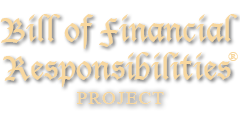What Can We The People Do To Fix The Federal Government Fiscal Mess?
Written and copyrighted by: John H Ramsey, Founder ![]()
![]() Project (BOFR) https://bofrusa.com/
Project (BOFR) https://bofrusa.com/
JULY 23, 2024
Understanding this article may be best accomplished by also reading three others in this series, found here: https://lnkd.in/e_7-SeuP.
The fiscal condition of our national government is a dangerous mess and getting worse by the day and nothing effective is being done by our federal and state elected officials to fix it. We The People are going to have to step up and do it or it won’t get done, at least not well, if at all.
So far in our public discourse and in feeble attempts by our elected officials we have focused on symptoms, serious and scary though they are, not the problem.
SYMPTOMS ARE NOT THE PROBLEM – A QUICK REVIEW
The financial management of our federal government has been getting worse for a long time. Consider these few examples…
- Unfunded liabilities of our federal government exceed $160 trillion, according to truthinaccounting.org. The total of these unfunded liabilities are approximately 4.5 times greater than our current national debt.
- Our national debt is now approximately $36 trillion and is increasing at an all-time high rate of about $2 trillion per year. Proposals now being actively considered such as cancellation of student debt, among others, will add significantly to these totals.
- It took 183 years, until 1972, for our nation to produce the first trillion dollars of GDP. In the roughly half century since 1972 our GDP has grown to $25.5 trillion, yet we have produced more national indebtedness from 1972 to 2021 than we did in the 183 years before it, combined.
- Annual interest costs of all this debt (not reduction of principal) now exceed the sum of the annual appropriations for our Defense Department and Medicare combined. Because we have waited so long to fix this, efforts to balance the budget while paying so much interest will inevitably mean sharp reductions and or cancellations of many government programs, each of which has a powerful constituency of citizens who benefit from these programs and who press hard to protect and possibly expand them. The two biggest of those non-defense programs are Social Security and Medicare. While speechmakers regularly promise that required reforms will exempt both of them, citizens are figuring out that reduced benefits from Social Security and Medicare may be under active consideration.
- Our tax code is 75,000 pages long and is full of special tax breaks and so-called incentives, so 56% of our people and 20-25% of profitable corporations pay no federal income tax while our nation is drowning in debt. The total of legal tax avoidance, or tax expenditures in IRS terminology, is $1.6 trillion per year, an amount of money equal to 72.7% of the amount of income taxes the federal government actually collects. And another $650 billion each year is siphoned off in tax evasion, according to the IRS, an amount of money equal to 29.5% of the amount the federal government actually collects. Further, The Commissioner of The IRS said in Congressional testimony that the total of tax evasion is closer to $1 trillion per year when the effect of crypto-currencies is included. So $2.6 trillion otherwise owed goes uncollected because of tax evasion that is not pursued, and by a system of legal tax avoidance that is so complex it cannot be efficiently enforced.
- Over $7 trillion of the payroll taxes we and our employers have paid for our retirement (Social Security), our senior years’ health care (Medicare), and into other federal trust funds have been misapplied to pay other government bills, denying our citizens the benefit of decades of cumulative compound returns that could have accrued from prudent investment of those tax receipts over the 40 plus years of our working lives. Instead, both of these programs are on the threshold of going broke.
- We don’t really know how bad things are because the numbers may not be right. America’s federal government is the only element of government in our country not subject to generally accepted accounting principles independently promulgated by experts, and independently audited on time by accounting firms with full transparency and timely reporting to citizens, including a full explanation and official acceptance of responsibility by leaders and managers for the outcomes. According to Reuters, at year end 2023 the Federal Government’s largest agency, The Department of Defense, failed an independent audit of its accounting systems for the sixth consecutive year.
- Our national regulatory structure is 170,000 pages long and according to Steve Forbes costs our economy about $2 trillion a year. Yet, ironically, the process of regulation is largely unregulated, does not have to derive its specific authorities from law, and as a practical matter is protected from independent judicial process.
Focusing on these and other symptoms rather than the underlying problem results in partial and inadequate solutions that ignore other symptoms and allow them to persist. The so-called balanced budget amendment, for example, is a simplistic example of this.
We cannot solve this piecemeal. Fixing federal financial mismanagement must start by recognizing that the symptoms are interdependent, so the solutions must be comprehensive.
Repeating solutions that have been tried before and have failed, such as Congressionally-controlled and/or Celebrity Commissions will most likely produce the same outcome. Requiring a BRAC-like up or down vote on Commission recommendations may be helpful, but only if the recommendations themselves are meritorious and will solve the whole problem.
THE PROBLEM
The real problem is our people and businesses send about $5 trillion to the federal government every year and there are no rules in our Constitution about what Congress, the Executive Branch, and the Judiciary may, must, or cannot do with it. None. No instructions or safeguards from the people to our Congress to require wise financial policy. In short, We The People send Washington a $5 trillion blank check, each and every year.
When they built our great Constitution our founding fathers gave us a playbook that is still going strong two and a half centuries later. But they didn’t finish the job. They didn’t establish rules to properly process and safeguard all the money we send to our central government every year. There was too much else to do in the hot summer of 1787. They had a country to build and huge obstacles to overcome to do it.
Maybe the founders would fix it later, after they had gotten the basics done. But they didn’t. Maybe future generations of leaders would do it. But they haven’t.
When the Constitution was ratified our federal budget was $4 million. Today our federal budget is over $5 trillion. That’s over one million times larger. But we continue to use the same Constitution, with no rules for proper financial management, as we did when our government was one millionth the size it is today.
Can you imagine any organization, public or private, that could grow by one million times and not change the basic operating rules governing the conduct of their affairs?
So 234 years later our Constitution remains silent on rules for safeguarding and properly managing the people’s money.
Justice Felix Frankfurter once said, “The history of liberty has largely been the history of the observance of procedural safeguards”.
Existing institutions at both the federal and state levels are rife with conflicts of interest and are therefore incapable or at least unwilling to recognize our fiscal problems and require honest, effective, comprehensive solutions. Senior members of Congress have repeatedly expressed an unwillingness to consider fiscal reform and systematically quash any reform efforts, whether from within or outside the institution.
An example of what we have come to expect from Congress is the current proposal for a Fiscal Commission that would if adopted specify that voting membership on such a Commission be limited to members of Congress, a blatant example of the fox guarding the hen house.
Powerful public policy non-governmental organizations (NGO’s) both within and outside Washington DC that could be part of the solution consistently fail to step up and advocate the policy actions that their many experts within and around them know full well are required.
Efforts to invoke Article 5 of the Constitution authorizing state legislatures to call for a Convention to Consider Amendments have been at work for at least 50 years, so far without success. Organizations actively leading efforts to convene an Article 5 Convention compete rather than cooperate with each other thus making success more difficult. Legal challenges to past state efforts that met threshold requirements are being slow-walked in courts.
THE SOLUTION
So that leaves us – We The People – to take direct action. If anything be done it is up to us. The problem is there are no Constitutional or institutional options for American citizens to directly amend our Constitution. Probably just as well.
Let us be clear-eyed. This is not going to happen without pain and even if it were painless it is not easy to do. We have waited too long for easy choices. Only the difficult ones remain. That may explain in part the institutional inertia at all levels.
It is not just about too much spending, bad as that is. Constitutional silence is producing bad results across the board. It is hurting our country. And it is hurting us. We need new rules so our government can better manage our money.
So what we need to do is create the next best thing- to organize our policy recommendations and then conduct an effective nationwide messaging campaign that results in such overwhelming support for effective, comprehensive change that both Congress and the state legislatures and the public policy NGO’s will have no choice but to fall in line and support these changes through one or both of the two existing opportunities for amending our Constitution- submitting amendments proposed by either Congress or an Article V Convention, or both- to a ratification vote by the people.
RECOMMENDED POLICY INITIATIVE
For consideration by every citizen, the best policy recommendation is the ![]()
![]() (BOFR) https://bofrusa.com, a citizen-led nonpartisan package of five amendments to our US Constitution that will establish permanent rules for the financial management of the federal government, requiring Congress to eliminate the caustic effects of decades of past fiscal mismanagement and mandate responsible financial management in the future by all branches of the federal government.
(BOFR) https://bofrusa.com, a citizen-led nonpartisan package of five amendments to our US Constitution that will establish permanent rules for the financial management of the federal government, requiring Congress to eliminate the caustic effects of decades of past fiscal mismanagement and mandate responsible financial management in the future by all branches of the federal government.
IMPLEMENTING THE RECOMMENDED POLICY
First, we suggest a thorough review and hopefully approval and recommendation of BOFR by a group to be established called WE THE PEOPLE’S FISCAL COMMISSION (WTPFC), consisting of roughly 15 (it could be a larger group but must be an odd number of members to prevent a tie vote) accomplished American citizens whose diverse membership will include different age groups, occupations and backgrounds. This group of volunteer patriots will be independent of Congress and will not include any currently serving government officials. It will replace the recommended CONGRESSIONAL FISCAL COMMISSION whose voting members would be limited to current members of Congress.
The WTPFC will be chaired by the founder of the BOFR Project, who will not vote on the final recommendations/proposals of the WTPFC.
The work of the WTPFC would take place over a roughly 60 day period and could include testimony from subject matter experts from within and without the federal government in the areas addressed in the BOFR amendments, i.e., taxes, federal spending, Social Security & Medicare, accounting/ auditing, and regulations.
A WE THE PEOPLE’S VIRTUAL CONVENTION (WTPVC)
Once completed the version of the BOFR approved by the WTPFC will be submitted to a vote of the people in a forum to be called a WE THE PEOPLE’S VIRTUAL CONVENTION (WTPVC).
Suggested slogan- “Move The Nation From Your Living Room”.
The WTPVC will be a one day long convention open to attendance by any and every American citizen, using the technology of such vehicles as Zoom and FaceTime. The day’s events will include a presentation describing the BOFR as approved by the WTPFC, followed by a few speeches in support and opposition.
The timing of the WTPVC will be widely publicized well in advance so that citizens may have plenty of notice to attend.
At the end of that day-long convention a vote of those attending will be recorded and the results broadcast to those in attendance just before the convention adjourns.
ACTIONS IN ADVANCE TO SUPPORT THE PEOPLE’S FISCAL COMMISSION AND VIRTUAL CONVENTION
To accomplish both these initiatives all our citizens, acting individually and in self-organized groups, and The BOFR Project Team must both take actions in support. Following is a list of proposed actions by both:
Things Our Citizens Can Do:
- Be a “town crier”. Spread the word to people and groups you know and encourage your fellow citizens to get involved, donate if they can, and spread the word.
Forward communications we prepare, and you approve, to your mailing list and to your contacts on social media, including LinkedIn and Facebook.
Volunteer your time and expertise in the critical areas of social media as well as traditional media strategy and implementation, communications, and public relations. - Seek support from organizations with which you are affiliated. Get them to forward our emails and endorse BOFR.
- Introduce BOFR and me to your contacts, particularly those with influence and or financial resources to help finance and underwrite our national outreach.
Withhold or discontinue all financial contributions to political candidates and parties, causes, and public policy institutions unless and until they support BOFR persistently and actively, in writing on their websites, and in communications with their networks and with members of Congress and your State Legislatures.
Facilitate both live and virtual speaking engagements for me and other BOFR advocates at group meetings in your communities and marketplaces.
Co-author submissions to various publications to further our reach. - Help recruit a head volunteer in each demographic group and in each state.
- Help produce a list of key influencers in each state and each of the two political parties.
- Send regular communications prepared by us and approved by you to your state and national elected officials.
The BOFR Project Management Team will:
- Get funding to finance the technology, social media support, and structure to underwrite the national messaging campaign and both the PEOPLE’S FISCAL COMMISSION AND VIRTUAL CONVENTION.
- Conduct a six month national messaging campaign using several targeted social media vehicles designed to reach and persuade various demographic groups.
- During that six month time period obtain endorsements from influencers and other public figures for BOFR.
- Get signatures from citizens supporting BOFR and supporting a WTPVC.
- Establish a date and time certain for the WTPVC. Advertise and encourage citizens’ attendance. Invite every current and former member of Congress and every current and former state legislator in the USA to attend the WTPVC and add their signatures of support for BOFR.
- Publicize WTPVC agenda that includes some speakers and concludes with a vote by attendees, hopefully in support of BOFR.
- Following the WTPVC have an open period when citizens who did not attend the WTPVC can add their signatures in support of BOFR.
Following adjournment the results of our virtual convention will be widely broadcast nationwide and hopefully will be viewed by office holders and influencers as a clarion call from American citizens urgently demanding comprehensive change in the way our federal government manages the financial affairs of our nation.




